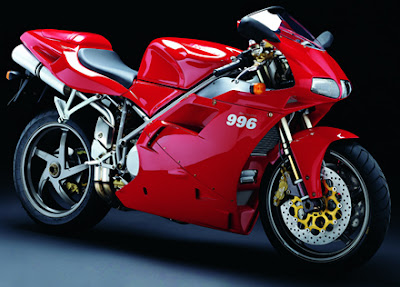
The Ducati 996 is an Italian street motorcycle manufactured by Ducati from 1999 to 2003. It was based upon the earlier 916. It competed against Honda's Fireblade, Suzuki's TL1000R and Aprilia's RSV Mille.
A black Ducati 996 is driven by Trinity during the famous freeway scene in the film The Matrix Reloaded (2003).
Versions of Ducati 996
From 1999, there were three different models of the 996: a base, or Biposto; the 996S with Öhlins suspension and the engine of the 996SPS and finally the 996R which was the second best in the 996 line which featured a new 996 cc engine.
Improvements of Ducati 996
The 996 had larger 98 mm (3.9in) pistons, larger valves, a stronger crankshaft and crankcases ported from the 916 SPS. But since the 916 camshaft gave a softer, less peaky power delivery and less top-end power: 83.5 kW (112 bhp) as against the SPS's 92.4 kW (124 bhp) the 996 was built with a new air intake system with two fuel injectors instead per cylinder. A new airbox and a distinctive underseat exhaust system were also built into the new design.
Ducati 996 Bike
The chassis was also modified but in a much more discreet way - the 916's handling was already well-regarded. Lighter wheels were introduced along with improved calipers, discs and pads stronger compared to the 916. The suspension system was still the same Showa design but both the front and back were fully adjustable for damping and preload.
Updates of Ducati 996
Updates in 2000 saw the wheels change and get updated to all new Marchesini wheels. The front forks were also titanium nitrided to reduce stiction. The spokes also changed from the three-spoke rim style of the 916 to a new five-spoke scheme. In 2001 another overhaul saw the 996 rear shock finally change from a Showa to an Öhlins increasing the 996's capability even more.
Range topper: Ducati 996 SPS
The 996SPS suffix stood for 'Sport Production Special'. The engine was the same as the one used in the 916SPS but the weight was cut down considerably. The 996SPS produced around 92.4 kW (124 bhp), more than the standard 996. The 996's special SPS engine was much stronger than anything that Ducati or any other manufacturer at the time had produced for the track. To ensure a distance was held between the standard 996 and the 996SPS Ducati designed a much higher specification chassis for the SPS. The wheels were a five spoke design but were lighter than the standard three spoke design of the 916 and the early 996. In 1999 the rear shocks were made by high quality Swedish suspensions manufacturer, Öhlins with Showa front forks. In 2000 Öhlins forks were added. The adjustable steering head also allowed geometry changes to the steel tube trellis frame making it suitable for different riding styles or race tracks.
Final updates of Ducati 996 SPS
As the 996SPS became a hot commodity, Ducati updated the bike with more advanced chassis parts to make it stay competitive. Most notably the Öhlins front forks featured a titanium nitride coating on the stanchions to minimise stiction. An aluminum rear subframe and other detail modifications reduced the bikes weight even further.
Specifactions of Ducati 996 SPS
- Engine: Liquid cooled, four stroke, 90° "L" twin cylinder, DOHC, desmodromic 4 valve per cylinder.
- Capacity: 996 cc
- Bore x Stroke: 98 x 66 mm
- Compression Ratio: 9.2:1
- Induction: Marelli electronic injection
- Ignition / Starting:- / electric
- Max Power: 123 hp 90 kW @ 9500 rpm (claimed at crankshaft)
- Max Torque: 99 Nm 10.1 kg-m @ 7000 rpm (claimed at crankshaft)
- Transmission / Drive: 6 Speed / chain
- Front Suspension: Öhlins with TiN upside-down fork fully adjustable. 127 mm front wheel travel
- Rear Suspension: Öhlins progressive cantilever linkage with adjustable monoshock. 130 mm rear wheel travel.
- Front Brakes: 2x 320 mm discs 4 piston calipers
- Rear Brakes: Single 220 disc 2 piston caliper
- Front Tyre: 120/70 ZR17
- Rear Tyre: 190/50 ZR17
- Dry-Weight / Wet-weight: 189 kg / 212 kg
- Fuel Capacity (res): 17 litres (4L)
- Consumption average: 16.4 km/lit
- Standing quarter Mile: 10.5 sec
- Top Speed: 280.8 km/h